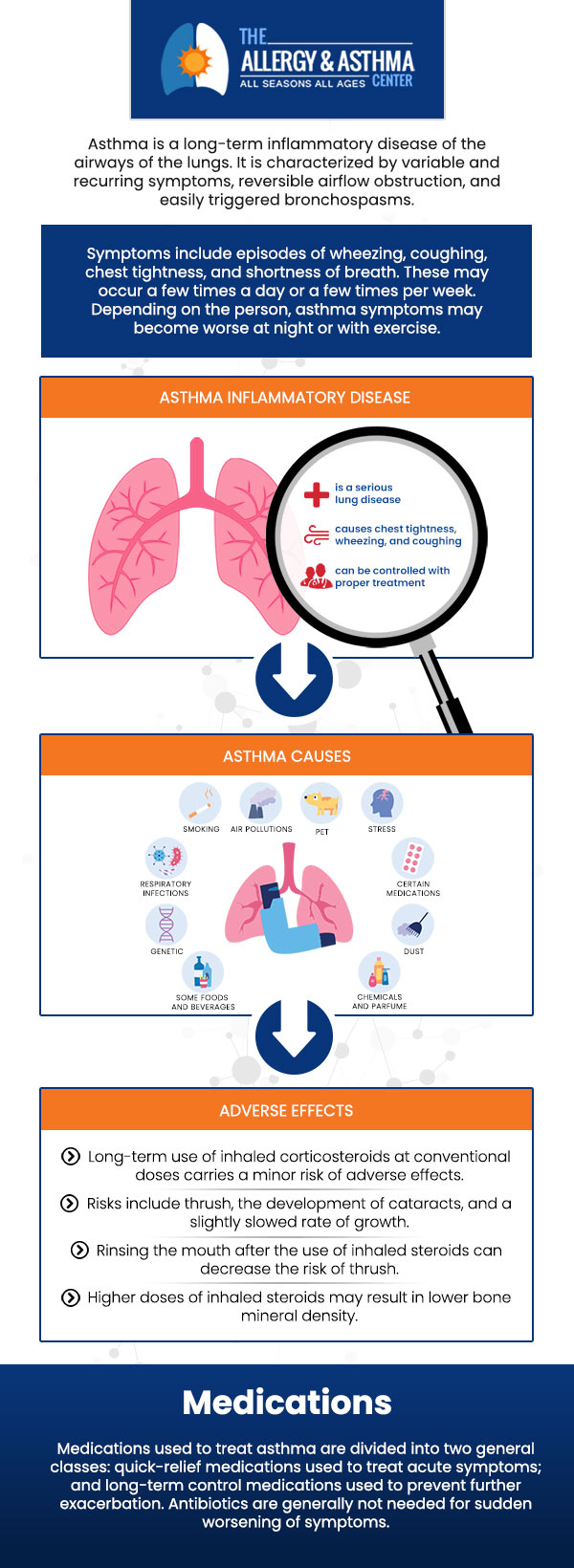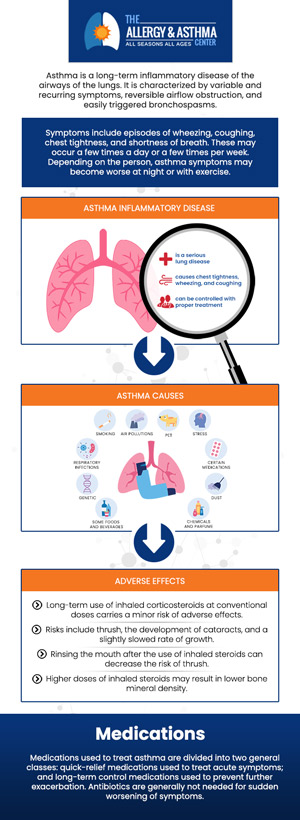What Are the Common Causes of Asthma?
At the Allergy and Asthma Center, we help identify the common causes of asthma, which include allergens like pollen, dust, mold, and pet dander, as well as environmental factors like air pollution and tobacco smoke. Genetics can also play a role, as asthma often runs in families. Respiratory infections and even stress can trigger asthma symptoms. Our specialists work with you to pinpoint your triggers and develop a personalized plan to manage and reduce asthma flare-ups effectively. For more information, please contact us or book an appointment online. We have convenient locations to serve you in Lawrenceville GA, Atlanta GA, and Conyers GA.


Table of Contents:
What are the main causes of asthma?
Can pets cause asthma attacks?
How does exposure to dust or pollen affect asthma?
How does air pollution contribute to asthma?
Asthma is a chronic respiratory condition characterized by inflammation and narrowing of the airways, leading to difficulty breathing. At Allergy and Asthma Center, our specialists recognize that asthma management requires personalized care tailored to each patient’s unique circumstances. While the exact causes of asthma remain unclear, our experienced allergists have identified several key factors that significantly contribute to its onset and progression.
Family history and genetics play a critical role in asthma susceptibility. Individuals in families with a history of asthma, allergies, or other respiratory conditions have an increased likelihood of developing asthma themselves. We provide thorough assessments of your family and personal medical history to identify genetic predispositions and implement preventive care strategies.
Environmental triggers are another crucial factor in asthma management. Common allergens include pollen from trees and grasses, dust mites, mold spores due to our humid climate, pet dander, and cockroach droppings. Our allergy specialists provide comprehensive environmental evaluations and allergy testing to pinpoint specific triggers, enabling targeted avoidance strategies and individualized treatment plans.
Additionally, respiratory infections, particularly those experienced in childhood, can heighten asthma risk. Our specialists emphasize the importance of early intervention and ongoing care to help minimize the long-term impact of infections on respiratory health.
Pets are a common trigger for asthma symptoms among individuals with allergies or respiratory sensitivities. Our expert allergists frequently help patients identify and manage symptoms caused by exposure to pets such as cats, dogs, birds, and rodents. These animals produce allergens—substances found in dander (skin flakes), saliva, urine, and feathers—which can irritate sensitive respiratory systems, leading to inflammation and constriction of airways. This can result in symptoms including coughing, wheezing, chest tightness, and shortness of breath.
It is important to understand that pet allergens can persist in your home environment, even when the pet is not physically present. These allergens can remain airborne for extended periods and can settle on furniture, carpets, clothing, and bedding. Consequently, asthma flare-ups can occur not only from direct pet contact but also from indirect exposure, such as visiting the homes of pet owners or interacting closely with individuals who have pets.
If you or someone in your household experiences asthma symptoms related to pets, schedule a consultation with the Allergy and Asthma Center. Our experienced allergy specialists can provide personalized assessments, guidance, and solutions tailored to your individual needs and lifestyle.
Exposure to dust, pollen, and other environmental allergens can significantly impact patients with asthma and allergic conditions, making specialized care essential. We understand that these airborne allergens—such as pollen from Georgia’s trees, grasses, and weeds or dust mites commonly found indoors—can trigger inflammation and irritation within your respiratory system. This reaction can cause your airways to narrow and swell, leading to increased mucus production and symptoms including coughing, wheezing, chest tightness, and shortness of breath.
When inhaled, dust particles and pollen grains stimulate the immune system, particularly in individuals with allergic asthma. Your immune system mistakenly identifies these substances as harmful, prompting the release of inflammatory chemicals, including histamines and leukotrienes. These chemicals cause bronchial muscles to tighten and airways to become inflamed, congested, and sensitive, making breathing increasingly difficult.
Seasonal pollen levels can be especially challenging, and ongoing exposure may lead to chronic inflammation and heightened sensitivity of the airways, intensifying your asthma symptoms over time. Our experienced allergists can provide comprehensive allergy testing, personalized treatment plans, and practical strategies to minimize your exposure to allergens. Maintaining a clean indoor environment, utilizing air purifiers, and limiting outdoor activities during high pollen seasons are crucial preventive strategies we recommend. With proper management—including tailored medication regimens, immunotherapy (allergy shots), and preventive measures—we can help you achieve better respiratory health, reduced symptoms, and an improved quality of life.
Air pollution is a significant concern for allergy and asthma sufferers, particularly in metropolitan areas. We understand how environmental pollutants directly impact respiratory health. Pollutants such as particulate matter, nitrogen dioxide, ozone, and sulfur dioxide irritate and inflame your respiratory tract, causing swelling and narrowing of your airways. For individuals already prone to asthma, this irritation can trigger asthma attacks and make breathing difficult.
Long-term exposure to urban air pollution can result in chronic inflammation of respiratory tissues, increasing airway sensitivity and hyper-reactivity. Even low pollutant levels can provoke asthma symptoms for those with heightened sensitivities. Additionally, airborne pollutants can damage the cells lining your respiratory tract, weakening their natural defenses and increasing your risk of respiratory infections, further aggravating asthma symptoms.
Children are particularly susceptible, as prolonged exposure to polluted air has been associated with reduced lung function and a higher likelihood of developing asthma. Studies clearly indicate that children living in urban areas with higher pollution levels experience more frequent asthma attacks, emergency room visits, hospitalizations, and reduced quality of life.
If you or your child suffers from allergies or asthma symptoms exacerbated by air pollution, our specialists are here to help. For more information, please contact us or book an appointment online. We serve patients from Lawrenceville GA, Atlanta GA, Conyers GA, Suwanee GA, Duluth GA, Grayson GA, Decatur GA, Brookhaven GA, Lithonia GA and Covington GA.

Additional Allergy & Asthma Services
▸ Allergy Shots
▸ Allergy Testing
▸ Asthma
▸ Bronchodilators
▸ Drug Allergy
▸ Food Allergy
▸ Insect Allergy
▸ Nasal/Sinus Allergies
▸ Pediatric Allergy
▸ Pediatric Asthma
▸ Skin Allergy
▸ Spring Allergies




